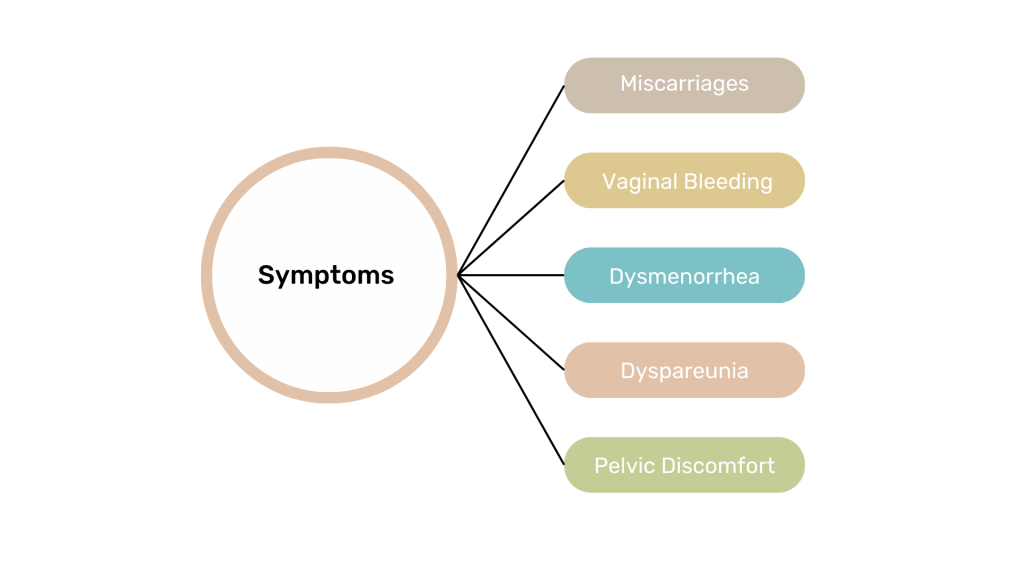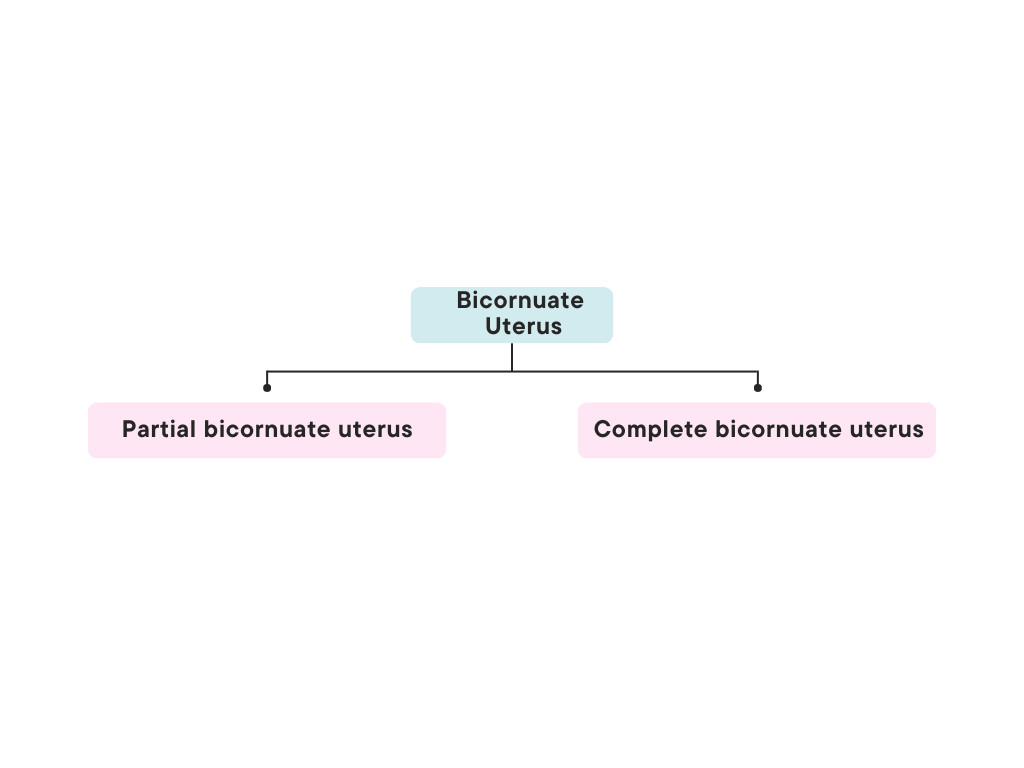
A bicornuate uterus, which is similar to a heart-shaped womb is a peculiar prenatal development of the womb that gives way to the abnormal separation of the uterus into two parts instead of it being one. This disruption could prevent one from conceiving, miscarrying several times, or giving birth prematurely. The prevalence of this condition is notably scarce, impacting merely around 0.4% of the population. Those with a bicornuate uterus might endure pelvic distress, recurrent miscarriages, or obstacles in fertility. An array of treatments, encompass medications and surgical interventions, depending on the severity of the symptoms. Timely detection and response are critical in preventing future consequences.
Given below are the symptoms and causes of Bicornuate Uterus. If you experience any of these conditions, get a timely diagnosis to prevent future consequences.

Recurrent miscarriages: A bicornuate uterus might make it difficult to conceive and maintain a pregnancy, resulting in recurring losses.
Although only 0.4% of the general population has a bicornuate uterus, the people who have suffered recurrent losses tend to be the ones who are also affected by this problem. Bicornuate uteri were discovered in 2.1% of women who had almost miscarried.
Vaginal Bleeding: Around one-fourth of women with a bicornuate uterus may have a prolonged vaginal septum, and this may lead to a double vagina (the patient may have initial symptoms that are similar to the problems with bladder, such as chronic urinary tract infection or recurrent pain during urination). This anatomical divergence means that there is a tissue design that is placed between the two channels of vaginal chambers. An alternative chamber can get bled off when tampons are used since they will fit into the partitioned tissue.
Dysmenorrhea: In women with a bicornuate uterus, the passage of blood through the cervix can be challenging, leading to menstrual pain.
Dyspareunia: In some individuals, the uterus is curved and tilted. It may be difficult to have intercourse depending on the nature of the curve.
Pelvic Discomfort: Certain bicornuate uterus occurs in human beings and shows symptoms of pelvic pain that are more revealed during menstruation or sexual activity.
A bicornuate uterus is believed to be the result of an abnormal prenatal development.
Book an appointment with our gynaecologist now!
During gestation, the formation of a bicornuate uterus experiences variations. Here is a simplified breakdown that explains its connected factors:
In general, around the 10th and 20th weeks of a female foetus pregnancy, the development of the uterus begins. Usually, two imports, commonly known as Mullerian systems, connect to become a uterus and a cervix. However, in the case of a bicornuate uterus, incomplete fusion occurs in the upper segment, resulting in a minor depression or heart-shaped uterus. The exact cause of this phenomena remains unknown; however, plausible contributing elements include:
Genetic Factors: Variations in genes essential to embryo development and duct formation may result in the creation of a bicornuate uterus. There may also be associations with other genetic abnormalities or illnesses.
Environmental Influences: Environmental factors can influence uterine development, while the specific pathways are unknown. Previously, diethylstilbestrol was linked to uterine difficulties; however, its use has been discontinued.
There are two main types of bicornuate uterus: partial and complete. Here’s a basic explanation for each:

Partial bicornuate uterus: This indicates that the uterine split is less severe. Your uterus still resembles a heart, but the divide is not as profound.
Complete bicornuate uterus: This variety has a more pronounced split at the top of the uterus. This makes the separation between the two parts of the uterus clearer.

Haemorrhaging: The majority of individuals with a bicornuate uterus exhibit no symptoms during adolescence. However, owing to the presence of two uterine cavities, some adolescent females may encounter menorrhagia or dysmenorrhea. Furthermore, within the early days of being pregnant, women with bicornuate uteruses might also get moderate vaginal bleeding due to the hormonal thickening and loss of the endometrium inside the opposing horn of the uterus.
Uterine Adhesions: Damage to the endometrium caused by harm or infection can lead to the formation of scar tissue (adhesions) among the inner walls of the uterus, resulting in ordinary adhesion of the partitions to each other.
Pregnancy Complications: Miscarriage, premature labor, third-trimester bleeding, and extraordinary placental attachment are more common in post-treatment pregnancies. The presence and severity of adhesions impact the chances of a successful pregnancy treatment.
Birth abnormalities: Children born to individuals with a bicornuate uterus are four times more likely to have congenital abnormalities in comparison to those born to moms with a normal uterus.
Some women with a bicornuate uterus can also experience dysmenorrhea (period pain) and menorrhagia (heavy menstrual flow).
Also Read: Treatments for Improving Low FSH Levels
Many people with bicornuate uteri can successfully carry pregnancies to full maturity. A study found that more than 62% of women with this abnormality may have a successful and healthy delivery. It is recommended that you contact your healthcare professional about your unique risks and measures for increasing the likelihood of conception and ensuring a healthy birth.
A bicornuate uterus is a delivery disorder that a woman is born with. It can not be prevented or stopped because it happens during prenatal development. The abnormal development of the paramesonephric ducts causes a bicornuate uterus.
Women with a bicornuate uterus can nevertheless have healthy pregnancies, as this patient did. However, they are susceptible to specific pregnancy problems. These can include the baby being in an unusual position (called foetal malpresentation), the membranes breaking too early (preterm rupture of membranes), the baby being smaller than usual for how long they’ve been growing (small for gestational age foetuses), having more miscarriages, giving birth too early (preterm deliveries), the baby not growing well inside the uterus (intra-uterine growth restriction or IUGR), and the cervix not being able to stay closed during pregnancy.
A bicornuate uterus can cause infertility, miscarriages, and premature birth. While there may not always be obvious symptoms, obtaining medical assistance is critical if you are experiencing painful menstruation or having difficulty getting pregnant. With the proper diagnosis and treatment, it is feasible to control the problems associated with this illness and have a successful pregnancy. If you have any concerns or questions, you should talk with your healthcare professional.
When it comes to bicornuate uterus treatments, KJK Hospital stands out as one of the best options. KJK Hospital, which is well-known for its expertise in gynaecology and female and male infertility, reproductive health, IVF, and IUI, has cutting-edge facilities and a team of experienced doctors dedicated to offering personalised treatment programmes for patients. From precise diagnosis to specific treatment choices, KJK Hospital provides comprehensive care focused on increasing the likelihood of a successful pregnancy while managing any associated difficulties. KJK Hospital, with a commitment to patient-centered care and a reputation for excellence, is a reliable choice for those seeking high-quality bicornuate uterus therapy.
Feel free to contact us for appointments and queries.
Mobile Phone No: 8921727906, 918547424080
Telephone Numbers: 0471-2544080, 2544706
Email: [email protected]